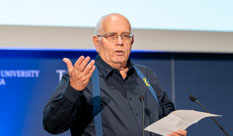More:
News & Stories
Uzbekistan-Israel: Launching Academic-Technological Collaboration
In recent days, a delegation from the Holon Institute of Technology (HIT) completed a successful visit to Tashkent, where they held a successful array of meetings with academic and research institutions.
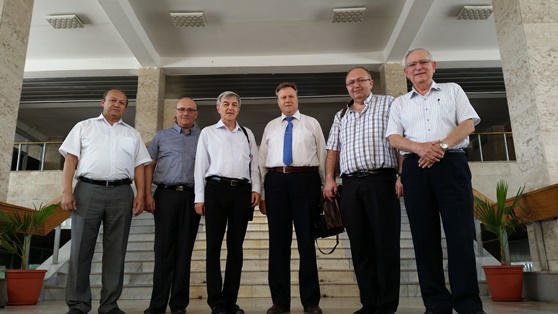
Visiting Tashkent State Technical University
"We are very satisfied with the results of our visit to Tashkent," HIT's president, Prof. Eduard Yakubov, who led the delegation, announced immediately upon his return to Israel. "Our plans were all accomplished, and the visit's program entirely realized. We made an important practical step towards initiating collaborative projects between our two institutions. Our meeting with the president of Tashkent State Technical University, Prof. Ravshan Saidakhmedov was exceptionally productive, and we were glad to find in him an understanding, thoughtful partner, who fervently desires the development of his university, relationships with the West, and raising the general level of technology in Uzbekistan.
I would like to extend my gratitude to Uzbekistan's ambassador to Israel, Mr. Oybek Eshonov; it was during his visit to HIT, not long ago, that the seeds for our collaboration were sown. He expressed his personal interest in having students from Tashkent universities study in Israel, and in having HIT's best lecturers give courses in Tashkent. We too have a lot to learn from the quality of instruction and research in Uzbekistan: during our visit we were introduced to fascinating innovations by our colleagues in the spheres of energy and nano-technology. Moreover, it's hard not to be impressed by the unique communication between students and teachers in Uzbek universities – such relations of honor and esteem for teachers, that are often lacking in our parts, together with a curiosity and thirst for knowledge by the students, are worthy of respect. I was struck most by young Uzbek men and women, who desire so much to study at HIT, that they are even ready to study Hebrew for this purpose.
Certainly, it's worth noting in this context the efforts of the Israeli ambassador to Uzbekistan, Mrs. Carmela Shamir; she spared no effort to advance our agreement and make sure the visit was successful. Our meeting with her in Tashkent was especially warm."
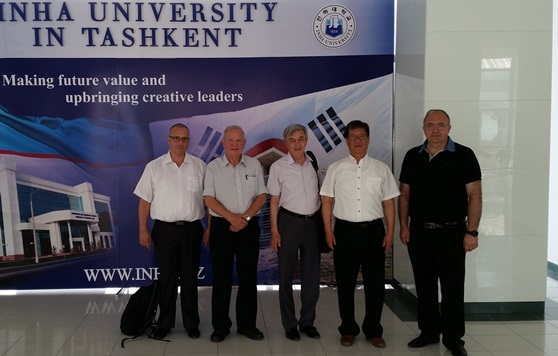
Visiting the South Korean Inha University Branch in Tashkent
During the visit, the HIT representatives – Dr. Refael Barkan, head of HIT's Research Authority and External Relations, Dr. Yosef Ben Ezra, Dean of the Faculty of Engineering, Prof. Ezra Zeheb, Dean of the Faculty of Science, and Prof. Eduard Yakubov – spoke about the achievements of the leading Israeli academic institution in preparing its graduates for hi-tech.
As a result of the meetings, the two sides signed a statement of intentions which will serve as the basis for a full agreement. It included a decision to set up forms of long-distance learning, for which both institutions will establish special centers. These will be equipped with the most up-to-date means for long-distance connections. HIT will support its colleagues in Tashkent in establishing such a center, in training a teaching staff and designing a relevant study plan. Plans were also drawn to organize academic stays of Uzbek professors and young scholars in Israel and, in addition, to begin collaborative scientific-technological developments that will lead to publications in scientific journals.
We should mention once again that HIT has become the first Israeli institution of higher education to engage in academic collaboration with a parallel leading institution of higher education in Uzbekistan – Tashkent State Technical University (Beruni). This agreement opens up a path for Uzbek youth to become acquainted with the Israeli higher education system in general and with the relations between academia and the hi-tech sector in particular. Introducing Uzbek students to Israeli entrepreneurship, with its firm roots in academia, could lead to new hi-tech ventures in Uzbekistan as well.
As far as Israel is concerned, there is deep symbolic and strategic significance to broadening its mutual relations with a Muslim country, one that has traditionally maintained a friendly relationship both towards Jews and the Jewish State.
The origin of the present initiative can be traced to a native Uzbek math professor, who is the first member of the Aliya of the 90s to become a president of an Israeli institute of higher education – Prof. Eduard Yakubov. Two years ago, he attended the Asian Forum for the use of solar energy, which was being held in Tashkent, and in the course of his work met with several leading figures of Uzbek higher education institutions.
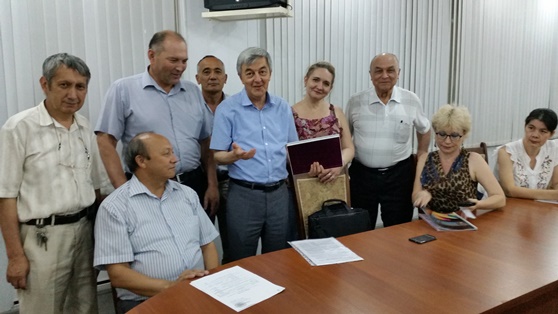
Signing the agreement for R&D and academic collaboration between the institutes
"I grew up in Kokand," relates professor Yakubov. "I graduated Tashkent University and worked for many years in this city. Arriving in my hometown as president of an Israeli institute of higher education, I saw that today's Uzbek youth combines a respect for Asian and European cultures, while also being open and attracted to new technologies."
Thus began a serious effort towards preparing an agreement. Uzbekistan's ambassador to Israel, Mr. Oybek Eshonov, visited Holon Institute of Technology (HIT) and was fascinated by the cutting edge research centers and laboratories found on campus. Several of them are unique in Israel – those in tribology, nano-materials, 3-d printing, non-ionizing radiation measurement. The ambassador was also struck by the fact that more than half of HIT's 350 lecturers are emigrants from the former Soviet Union; having emigrated to a foreign country, they were able not only to build solid careers, but even to reap outstanding success, as measured by scientific publications and winning national grants and prestigious international awards. At the same time, they are native Russian speakers, and the absence of a language barrier is a very significant advantage where collaborative work is concerned.
"The visit to HIT," says Oybek Eshonov, "convinced me that we have found a reliable partner, ready to engage in joint research projects and collaboration in science, technology and education. Of particular importance to Uzbekistan are such subjects as nano-technology, plasma physics, information technologies including cybersecurity, and alternative energies. Of course, the opportunity that will be granted to Uzbek students to study abroad in Israel is quite appealing. In Uzbekistan, we regard with great respect the achievements of the Jewish state. Israelis on their part have recently been expressing a growing interest in the Uzbekistan's original culture and its rich heritage, with which they were formerly unfamiliar. The placid, stable atmosphere which reigns in our Republic facilitates such an acquaintance, and permits establishing exchanges between students and lecturers of both states.
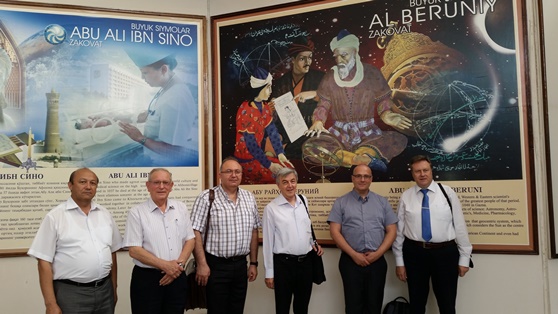
Visiting Tashkent State Technical University
The carefully fashioned text of the agreement includes also a paragraph about the formation of joint study programs, and about conferring two diplomas – both Israeli and Uzbek. At present, the two sides have come together to discuss the concrete details of realizing the agreement. It may be safely assumed that in the coming academic year, a first group of students and lecturers from Uzbekistan will be on hand in Israel.
Our collaboration in the field of higher education successfully complements the developing collaboration between the two countries in agriculture, business, medicine, and tourism."
- News & Events
New Collaboration with Sheba Medical Center will qualify nurses to work in a digital environment.
Collaboration between HIT Holon Institute of Technology, the teaching authority of the Sheba Medical Center, and the Sheba-BEYOND virtual hospital will allow training nurses in Israel and around the world to work in a digital...



 Additional programs
Additional programs
